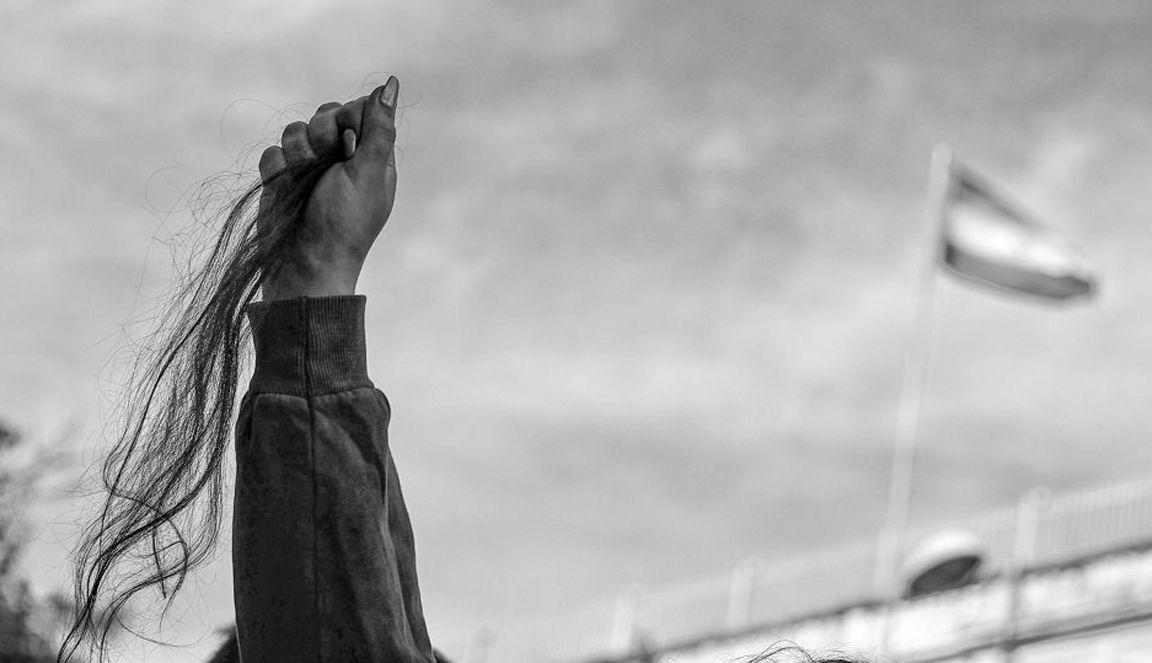As an Iranian-American who came to the United States in 1989, Chief Member Bita Milanian knows how different her life could have been had she stayed in her home country. “I remember I was 12 years old,” she says of the time when she was pulled over by Iran’s morality police. “That day I was wearing a colorful scarf, and I believe that kind of triggered them. But, my hair was fully covered.” Milanian explains that at the time, women in Iran were only allowed to wear black, gray, brown, and navy, and anything outside of those colors would be considered a violation of the country’s strict dress code.
“I was wearing a long coat, pants, and fully covered, and they still somehow got suspicious and followed me and asked me what I was holding in my hand,” she says. “I didn’t even know what they were talking about, but at the time they were also worried about organizations or groups that were anti-regime and recruiting young people to go against [the government].” Thankfully, Milanian says, she wasn’t arrested.
“They didn't put me in the car because I begged and begged and begged. I said I didn't have anything, and they finally let me go,” she says. “That was my luckiest day because my life could have changed had they taken me.”
Milanian’s story is no different than many other women who have lived in Iran following the Islamic Republic's takeover in 1979. “For the last 43 years, one of the tools of control has been the hijab for women,” says Chief Member Reihaneh Irani-Famili, who is of Iranian heritage. “It was something that was forced on society, and then it was used as a tool of fear. If you don’t have a hijab, or it’s not compliant with their definition of it, you can be arrested, you can be beaten, and you can be fined.”
That’s why the death of 22-year-old Mahsa Amini, an Iranian woman who died in police custody on September 16, three days after being arrested for wearing her hijab too loosely, has sparked outrage and ongoing protests around women’s rights and freedom in Iran. “It touched a lot of nerves and it touched a lot of hearts,” says Irani-Famili. “It could have been me. It could have been my sister. It could have been my mother. It could have been anyone.”
Since Amini’s death, thousands of protestors, both men and women, have taken to the streets of Iran to not only stand in solidarity with her, but to also demand freedom from the strict regime of the Islamic Republic. “I want to reiterate though that what's happening in Iran has nothing to do with Islam,” says Milanian, clarifying that many Western countries have confused recent protests as anti-Islam sentiment. “But this notion is farthest from the truth as one woman’s fight for freedom should have nothing to do with another woman’s decision to wear a hijab. We're not asking people not to wear the hijab, but rather make it a choice.”
Both Milanian and Irani-Famili explain that while the hijab has certainly taken center stage, with many women burning their scarves in the streets of Iran, it is a symbol of a larger fight for women’s rights and humanity.
“Iranians aren't just fighting to choose to wear the hijab or not. Women are fighting for the ability to divorce, to travel without approval from their husband or father, to compete freely in sports, and to have a choice around education and profession,” says Milanian. Under the country’s current ruling, many women and girls are denied an education. And for those who are afforded the opportunity to attend a local university, they face extreme discrimination when it comes to finding a job. “It’s the first time in over four decades that the world is getting to know the real Iran.”
In addition to women’s rights, Milanian makes it clear that this fight is also about LGBTQIA+ rights and religious rights. “You cannot be gay in Iran because you will be hung and you will be prosecuted,” she says. “And you cannot practice any other religion. People who believe, let's say, in the Baháʼí Faith are prosecuted.”
How Leaders Can Show Their Support
Like many social justice issues, the current protests in Iran have led many leaders to wonder what steps they should and shouldn’t take when voicing their support. For starters, Irani-Famili says it’s important for executives to have a clear understanding of the workforce they lead and how the ongoing crisis in Iran affects their Iranian employees.
“I've talked to a lot of my friends and it doesn't matter if you've ever lived in Iran or not, or how long ago you've left the country, it’s really emotional seeing all of these scenes and hearing what is happening to young people,” she says, while emphasizing that this protest is led largely by Gen Z and millennials. “ So understanding your workforce and what they're dealing with, and creating a space so that they can share their feelings is really important.”
For some leaders, this might include providing time off and giving space for those who are affected by the ongoing situation. For others, this might mean creating space within an employee resource group for employees to discuss the news and the impact it’s having on them and their family.
Additionally, Milanian says it’s imperative for executives to arm themselves with information about what’s going on so that they can properly educate their staff who may be unaware and further spark a safe space for dialogue. “There are so many petitions going around from Amnesty International to Change.org in support of the people of Iran,” she says. Additionally, she suggests you can “call or write to your representative about this human rights violation. We just need to continue to amplify the message because we don’t want this to die down. We don’t want this to go away.”
Today, Iran isn’t the only country with repressive laws that infringe on women’s rights. Earlier this year, French lawmakers voted to ban women from wearing a hijab while playing sports. And while Saudi Arabia’s ban on women driving ended in 2018, women are still under strict control in the country. In August, Saudi activist Samla al-Shehab was sentenced to 34 years in prison for tweeting about the need to abolish the country’s guardianship system, which gives men legal control over many aspects of how their wives and other female family members live.
“This is a global issue,” says Milanian. “Women should have autonomy and agency over their body and have the freedom to do the many things we take for granted here in the West.”

